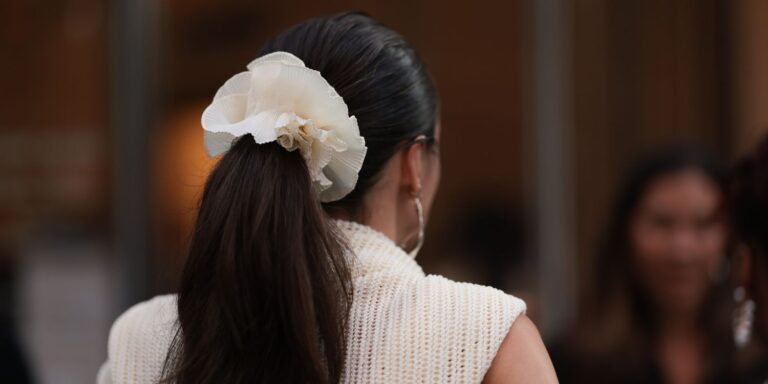When it comes to oils that promote hair growth, rosemary tends to get the most attention, but pumpkin seed oil is also a strong contender. Not only does it make for an indulgent seasonal latte, this fall favorite is packed with essential fatty acids and phytosterols. These nutrients support scalp and hair health, and research shows they may help address the underlying causes of hair loss.
Meet Our Experts
Hadley King, MD, is a board-certified dermatologist and clinical instructor of dermatology at Weill Cornell Medical College. Penny James is a board-certified trichologist and founder of the Penny James Trichology Center. Sophia Emmanuel is a board-certified trichologist and founder of Crown Worthy.
Ahead, we turned to the experts to break down the science and explain how to most effectively use pumpkin seed oil for hair growth.
Jeremy Mohler/Getty Images
Benefits of Pumpkin Seed Oil
Pumpkin seed oil is rich in several vitamins, essential fatty acids, and phytosterols that support hair and scalp health in a variety of ways. “The anti-inflammatory and antioxidant properties of pumpkin seed oil may help to soothe the scalp, reduce scalp itch, and promote hair follicle health,” says trichologist Penny James.
Of course, the benefits of pumpkin seed oil will vary depending on whether you ingest the oil or apply it topically. Here’s what research has to say about how to reap the benefits of each:
Supports Hair Follicle Health
Dermatologist Hadley King, MD, says the fatty acids in pumpkin seed oil “support hair follicle health because they have emollient properties.” This translates to improved skin barrier function, membrane fluidity, and cell signaling. James says omega-3s in particular “reduce inflammation, support hair follicle health, and improve hair quality.” On the other hand, a fatty acid deficiency can lead to hair loss, says Dr. King.
Strengthens hair
Another important role fatty acids play is supporting the structural integrity of hair: “Fatty acids strengthen hair and reduce breakage and split ends. They support the overall elasticity of your hair by providing the necessary building blocks,” says James.
Jeremy Mohler/Getty Images
May reduce hair loss
Dr King explains that one of the hormones that is primarily responsible for female pattern hair loss is dihydrotestosterone (DHT). Trichologist Sophia Emmanuel adds: “DHT shrinks hair follicles, causing healthy, thick hair on the temples, crown and forehead to thin.”
Research has shown that consuming pumpkin seed oil affects the activity of an enzyme called 5-alpha reductase, which converts testosterone to DHT. So by lowering DHT levels, the plant sterols in pumpkin seed oil may help reduce hair loss and thinning, says James. Research has also shown that fatty acids such as oleic acid and linoleic acid, which are abundant in pumpkin seed oil, may inhibit 5-alpha reductase.
While these results are promising, the scope of the study is limited, and Dr. King says more data is needed to determine how effective pumpkin seed oil is at reducing hair loss and thinning.
May Support Hair Growth
The omega-6 fatty acids in pumpkin seed oil “help balance moisture in the scalp, providing moisturizing benefits that are essential for healthy hair growth,” James explains. The oil also contains vitamin E, which may improve blood circulation to the scalp, promoting hair growth, he says.
Additionally, Dr. King cites a 2014 study that found that men who took a pumpkin seed oil supplement experienced 30 percent more hair growth than the placebo group. However, this study was only conducted on men, and the pumpkin supplement participants took contained other ingredients, so it can’t be said with certainty that it was pumpkin seed oil alone that improved hair growth.
A small 2021 study of women with female pattern hair loss compared the effects of topical pumpkin seed oil to minoxidil, the gold standard medication for alopecia. After three months, both groups saw a significant increase in hair growth and a decrease in hair shaft diversity (an indicator of alopecia), although the minoxidil group saw slightly greater improvement.
Side effects
“Pumpkin oil is great for the body, but it can cause skin redness and an itchy scalp,” says James, who recommends using it in small amounts and suggests that people with rosacea or oily roots avoid pumpkin seed oil altogether. Dr. King adds that people with pumpkin allergies should avoid the oil.
Hair Type Considerations
“Your hair type has absolutely no bearing on whether pumpkin seed oil will be effective,” says Emanuel, who adds that people with all hair types can potentially benefit from pumpkin seed oil, but results will vary from person to person.
How to use
Ingestion
Pumpkin seed oil can be taken on its own or as a supplement. “When pumpkin seeds are taken orally, they are carried into the bloodstream,” says Emanuel. “It may aid in the absorption of nutrients and vitamins better than taking them topically.” That said, she warns that supplements are best taken under a doctor’s supervision, who can discuss your specific health needs and potential side effects with you.
Apply
You can also warm up some pumpkin seed oil and rub it into your scalp, or use a product that lists pumpkin seed oil as one of the ingredients, though “when applied topically, the effects are limited to the area where you apply it,” says Emanuel.
summary
Research suggests that the essential fatty acids, phytosterols, and vitamins E, A, and K in pumpkin seed oil support hair and scalp health. Researchers believe that pumpkin seed oil may reduce certain types of hair loss and support hair growth, but larger, more comprehensive studies are needed.
Before trying anything on your own, Emanuel recommends consulting a professional to determine the underlying cause of your hair troubles: “If there is an underlying cause for your hair loss, such as poor diet, nutritional deficiencies, hormones, stress, or taking certain medications, there is no guarantee that taking pumpkin seed oil orally will regrow your hair,” says Emanuel.

